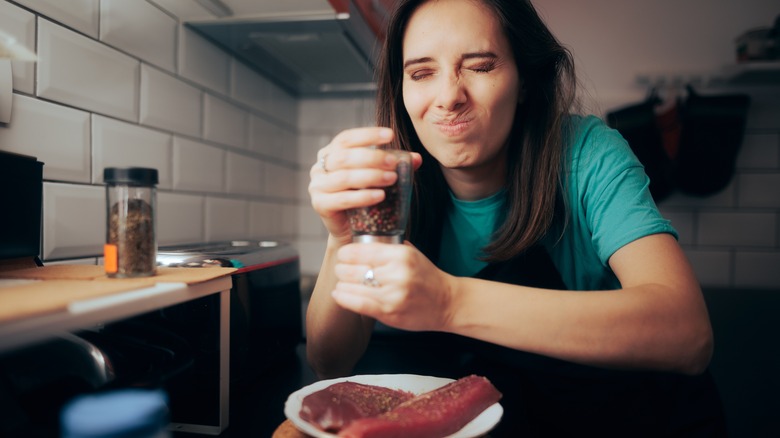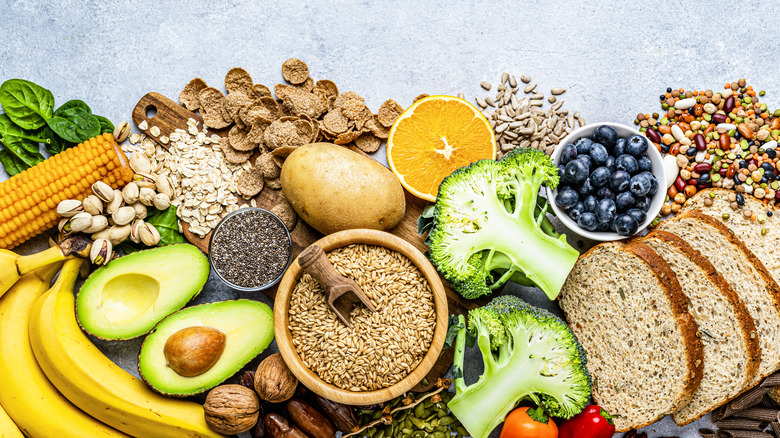The Nutrient Deficiency That Could Be Causing Your Low Sex Drive
The quality of your relationship, mental health concerns, underlying health problems, medications, stress, and hormonal imbalances can all cause a low sex drive. But did you know that the foods you eat — more specifically, the nutrients in the food you consume — can have a bearing on your libido too?
If your mind is veering toward oysters, you're right; they're known as aphrodisiacs, but we're actually referring to a more common and widely consumed kind of food — high-protein meats like beef, chicken, and pork. Turns out they contain certain natural chemicals — the amino acids carnitine and arginine and the mineral zinc — that can be good for your sexual health.
Per a 2019 study published in The Journal of Sexual Medicine, arginine supplements were found to be effective in treating mild to moderate erectile dysfunction (ED). Arginine aids your body in building protein. It also helps your sex drive by boosting the presence of nitric oxide in your blood, which in turn expands your blood vessels, improving blood flow to your sexual organs. Carnitine has been linked with promoting testosterone production, making existing testosterone more active, improving blood flow, and boosting testicular health. Zinc (also found in oysters) is tied to testosterone production. Testosterone isn't just a male hormone. In fact, it is the sex hormone associated with desire for both men and women. Supplementing with zinc (when there's a deficiency) has been shown to increase libido in women and men.
Should you load up on meat to combat low sex drive?
If these nutrients are so good for libido, does that mean you need to start eating lots of meat? Not necessarily. You can turn to the best protein sources that aren't meat too. The three nutrients in concern — carnitine, arginine, and zinc — can be found in non-meat sources like whole grains and dairy products.
While red meat has the greatest amount of carnitine, milk, whole-wheat bread, asparagus, and avocado contain some amount of the amino acid. But the concentrations are a lot lower so you may want to think of supplements — after speaking with your doctor and determining whether you're deficient, of course.
Arginine can be found in pumpkin seeds, soybeans, peanuts, chickpeas, and lentils too.
As for zinc, apart from seafood and meat, you can find this libido-boosting mineral in kidney beans, chickpeas, nuts, oats, hemp seeds, pumpkin seeds, sesame seeds, and tofu. There are also zinc supplements available for those who might be deficient, but again, this is probably something you should be running by your healthcare provider before including it in your diet.
Going back to the meat sources, however, there is also such a thing as too much protein.
When it comes to sex drive, balanced nutrition is better
People often go meat-heavy when they get on certain diets that promote low carb intake. We're talking the Atkins diet, paleo diet, and such. However, according to a 2022 study published in Nutrition and Health, a diet very high in lean proteins could increase cortisol production and lower testosterone levels in men. These could contribute toward ED and decreased fertility, per the researchers.
Although this particular problem might only relate to those consuming excessive amounts of protein, it sheds light on the importance of balance when it comes to nutrition, especially when sex drive is concerned. As explained by urologist and men's health specialist, Dr. Akash Kapadia, "There is a balance and a happy medium in urologic medicine that allows for equilibrium and better health. When this balance is thrown off, we often see the results in our sexual health." A diet high in meat consumption, especially red meat, has also been linked to heart disease, diabetes, and certain chronic illnesses.
While there is science to back the claims that certain foods do boost your libido, a healthy diet is about consuming whole grains, sufficient amounts of protein, lots of leafy greens, fruits, healthy fats, etc. If you've lost your sex drive and your Spidey senses (translation: gut feeling), are pointing toward a particular nutrient deficiency, you might be better off discussing this concern with a healthcare professional. Blood tests along with a complete analysis of your symptoms might provide a better clue as to what's lacking.



